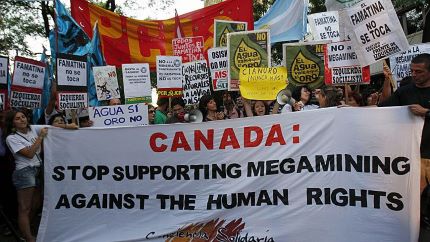The results of mining benefit every Canadian, found in virtually every product we use and throughout our economy. Through private pensions, the Canada Pension Plan, mutual funds and individual investments, most Canadians have a stake in Canadian mining operations, and the industry itself accounts for over a fifth of total domestic goods exported (MAC, 2011). Internationally, 20% of Canada’s direct foreign investment is in mining operations and over 50% of the mineral companies listed on the Toronto Stock Exchange (TSX) are based in Canada (MAC, 2011).
Regrettably, however, there is a dark side to Canadian mining. A major player around the world, Canada’s mining industry has also increasingly come under scrutiny for issues of transparency, corruption; human and labour rights and environmental damage.
Why should Canadians care about this? Firstly, because those of us who benefit from this industry also share responsibility for it. More than that, Canada is a country with many blessings; a peaceful well-educated population, and tremendous natural, cultural, economic and social capital that are the envy of many. We don’t need to harm others and the environments upon which their lives depend to increase our wealth and profits. Unfortunately, that is exactly what we are doing around the world.
The Impact of Canadian Mining
Much of the mining done by Canadian companies occurs in developing countries. Low operating costs due to negligible protection for workers, communities and the environment make these places attractive for Canadian and other international mining companies. Despite the existence of best practice guidelines, many Canadian companies are still failing to invest adequately in local consultation, community development and environmental protection. In fact, Canadian companies have the highest incidence of conflict relative to their global competitors (CCSRC, 2009).
As a result of poor company behaviour we are seeing increasing protests against Canada over issues of public health, worker safety, environmental damage and human rights. In a new paper entitled Canadian Mining Operations Around the World: Respecting People and the Environment, we examine recent cases in Guatemala and the Democratic Republic of Congo.

Why is This Happening?
We see these failures as the result of four key weaknesses:
First, the lack of mandatory international standards for corporate social responsibility allows companies to take advantage of the weak regulatory and enforcement systems and corruption present in many developing nations.
Second, many companies only adopt CSR policies in the face of external pressure or to placate investors and shareholders and do not adequately engage local communities and groups impacted by the company’s operations. Far too often, marketing and public relations are given much higher priority than meaningful action.
In addition, companies that do develop CSR policies rarely undergo independent audits to assess public benefits or effectiveness nor do they reliably provide public reporting on labour and environmental practices, social development investment or financial transactions abroad.
Finally, there are no structures in place in Canada to hold mining companies legally accountable for harmful practices abroad. The Office of the Extractive Sector Counsellor, created by the Government in 2009 has potential but currently only provides a non-binding forum where resource conflicts can be resolved among stakeholders. It is not within the power of the office to legally ensure that fair and workable solutions are met between the stakeholders.
How Can Canada’s Extractive Industries, and Indeed All Canadian Companies Better Represent Canada Abroad?
In order to address these problems we call upon the Canadian Government to convene as soon as possible a process for drafting legislation which would create legally binding standards for Canadian companies operating internationally, beginning with the mining industry. We believe that this process should include the provinces, business, and civil society in order to earn social license and broad support. The standards should require all companies to uphold no less than the best of Canadian standards for worker health and safety, community consultation, social development, labour and human rights, environmental protection and financial transparency wherever the operate in the world.
If we Canadians are satisfied with achieving our wealth and comfort at the expense of the well-being of people and environments around the world, then let’s stop pretending to a higher code of conduct. If, however, we are truly committed to human rights, social justice and environmental stewardship it’s time for Canada and Canadians to make some serious changes. We can start by ensuring that the companies we support as taxpayers, investors and customers treat other people and their environments with fairness and respect.
For more on this issue, read our recent report: Canadian Mining Operations Around the World: Respecting People and the Environment
Works Cited
Canadian Centre for the Study of Resource Conflict. 2006. Corporate Social Responsibility: Movement and Footprints of Canadian Mining and Exploration Firms in the Developing World. Retrieved from: http://www.miningwatch.ca/sites/www.miningwatch.ca/files/CSR_Movements_and_Footprints.pdf
Mining Association Canada. 2011. Facts and Figures of the Canadian Mining Industry. Retrieved from: http://www.miningnorth.com/wp-content/uploads/2012/04/MAC-FactsFigures-2011-English-small.pdf
